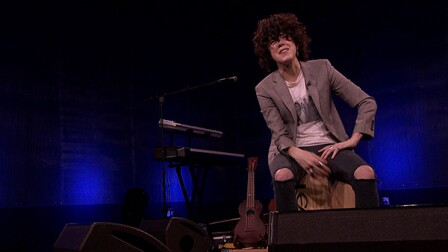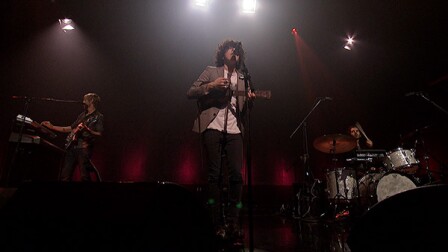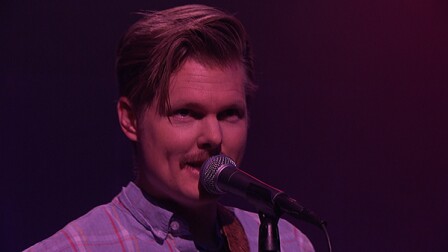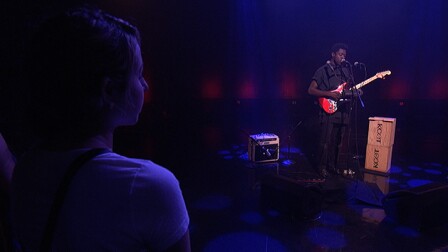
First Person: Kan Wakan
Pairing chamber pop with Kristianne Bautista's smoky vocals, Kan Wakan brings its downbeat cinematic sound to Artbound Presents Studio A.
Vocalist Kristianne Bautista, songwriter Gueorgui Linev, and producer/guitarist Peter Potyondy share the story of Kan Wakan in their own words:
On the Band's Name
Gueorgui Linev: It's inspired by a Tagalog word kalawakan which means...
Kristianne Bautista: It's a loose term for atmosphere, outer space, interstellar and it just felt like it was the right word for us.
GL: Her background is Filipino also, so we thought it was appropriate.
On How They Met
Peter Potyondy: We were all sort of on the LA music scene, what was it, maybe like, three years ago. I was just out of USC, I played in a couple of bands there and Kristianne was up in Valencia playing bass and drums in some garage bands and punk bands, and George had been involved in a couple projects here for a few years. I think George had the initial concept of developing what was originally a minimalist classical ensemble with actually quite a lot of people. I think our first couple rehearsals there were 12, 13, 14 people involved. And yeah, we all met through friends of friends and professional references, and classifieds, and just culled together as many people as we could.
GL: So it was kind of a collective.
PP: It was a big, long, complicated process that took several years.
GL: Once we all got together with Kristianne and started singing some songs together...
KB:It took us a while to kind of figure out what our style, or, what we wanted to do. But, eventually it kind of meshed to what it is now.
GL: Yeah, we even had two singers at one point.
KB: We did.
On Songwriting
GL:It varies from song to song. Most of the time it'll be some music that I come up with that we'll then get together and sort of mold together. And Kristianne will sometimes bring in some ideas or she'll have some lyrics that we'll collaborate on.
PP: We're all very production oriented. We'll be piecing them together like, one part at a time, hundreds of parts sitting in our personal studios, just brainstorming left and right for all these various instruments and then narrowing them down to the ones we ended up keeping on the record.
PP: We brainstorm together, usually in George's studio, his home studio, to start and then we come into our rehearsal space studio and play a bunch of demo tracks down in Logic.
They're really complicated songs and there is a whole lot going on and so it's a long process of constantly looking for inspiration and trying not to get bored of the idea while it's developing and keep it exciting but keep it accessible, cause that's often a problem for us. Trying to communicate classical ideas and these different ideas that might not be entirely accessible in a pop format, so that's the balance that is sometimes difficult to strike.

On Their Influences
PP: I think our influences...the development of our influences over the past three years as individuals I think has changed as much as much as the differences we have between each other. So keeping up with ourselves is sometimes as much a problem as keeping up with each other.
We've all inspired each other to look into different kinds of music, especially George. George is a kind of a connoisseur of so many types of music. He's introduced us to a lot of things, and Kristianne as well has introduced me to a lot of different types of music that I wouldn't otherwise listen to. You're always looking for inspiration so you won't get bored, so you're just listening to new things and trying to figure out what's inspiring.
KB: I wouldn't know what I bring exactly, but, what I do like, I think is apparent in my vocals. I'm really into soul music and hip hop and punk and jazz and I think that I try to kind of incorporate all of those elements into what we do here. Because we have such a varied style in each of our songs.
On Their Upbringings and Their Influence
KB: Born and raised in Southern California. Everyone in my house was just constantly listening to different records. So I grew up listening to a bunch of different music and I just kind of fell in love with every genre out there and kind of, that's how I've gotten my style, I guess. It's interesting because I grew up with such different people around my life that like different things and I just kind of take an interest in everything that's out there.
GL:I was born in Bulgaria and strong classical influence came from my uncle. Basically he was a conductor in the 90's in Europe, went all over Europe doing opera stuff and I grew up going to operas with him. First one I went to was called "Aida" and that was at the Sofia National Opera House and that was the first show I saw. And, yeah I mean, that's all the music I was exposed to. I didn't even know who Jimi Hendrix was until I was a teenager. And at that point I moved to the states and my mom was really into blues, you know, like John Lee Hooker and Stevie Ray Vaughan and stuff like that, so I was listening to a lot of blues because of her cassette tapes and stuff. I would steal them from her bedroom and listen to them. I think, those two worlds-- the more classical, orchestral music and blues-- kind of were kind of the foundation of what I'm into really, stylistically. And then more recently I've been into electronic music as well.
On Their Debut Album
PP: We're really happy with it. It's the culmination of a lot of years, a lot of hours, a lot of late nights of work. We've been waiting to share it for too long, so we're just really really excited that some of the songs are starting to make their way to the public.

On their HBO Spot
KB: I have a funny story about that. I remember, I woke up one morning and got a bunch of text messages and I knew we were gonna be on an HBO spot but I thought it was gonna be a short 5-10 second thing and then my friend said "go turn on your TV to HBO" and it ended up being this long preview and I'm still freaking out about that to this day. It's amazing. But what happened was that our manager was sending out our stuff to a bunch of...
GL: Well, I think he, I basically think whenever TV spots like there are looking for music, they'll send out a newsletter and say "we're looking for this kind of song for this" and people submit for it, so I think our team submitted some music to them for the spot and they happened to like it and they chose it so we were very surprised and very grateful we got that because, obviously, it exposed our music to a whole bunch of people that otherwise wouldn't have a chance to hear it. I think some of us like some of the shows on the spring preview, you watch "Game of Thrones," don't you, Peter?
PP: Yeah, a bunch of True Detective. Yeah, actually a lot of people have been asking us about that, like "is it relevant," or "are things like that generating a fan base?" I was kind of taken aback that that question has been coming up as much as it has been. But yeah, certainly, absolutely, it has translated into introducing us into some new places.
On the song "Moving On"
PP:The meaning aside, the actual composition of the song I think was kind of interesting because it started out with a more acoustic drumbeat and I think it was a little bit slower and it had a kind of like, the Bill Withers kind of vibe. That was the very original demos and as we built it up we kept getting more excited and wanted to make it a little bit faster and more electronic and started incorporating a bunch of other sounds. I think the strings actually came along pretty early in the process for that one as well.
GL: Yeah, like with a lot of the songs I think it starts out with a loop, like that one particularly is a piano loop.
PP: George likes to sit around with his looper and delay pedal in rehearsal space for like three hours while we're all eating lunch and he just like, loops things by himself (taps foot imitating pedal) [GL: Yeah], it's really fun to sit outside listening to him. He really gets in the zone with it.
GL: It's fun to layer things.

On the Song "Forever Found"
KB: It kind of has a "Romeo and Juliet" scenario where you fall in love with someone and your whole family is against it but yet you decide to continue your relationship with that other person and nothing else matters and that is what "Forever Found" is about. In the song there's different scenarios.
GL: Yeah, it's very much like a narrative-type of style, influenced by Leonard Cohen. Like if you listen to a lot of his stuff it's kind of like he's telling a story rather than, he's like narrating through a song mostly. This is what happened and check it out. And that was kind of the influence behind the lyrics. And then musically, it's like Serge Gainsbourg, Scott Walker kind of like, French Jean-Claude Vannier string arrangement style. That kind of arrangement is like, real 70's-type stuff. And I think a common thread as well is the groove. Really groovy arrangements and like the drums and bass, gonna to make you feel something.
On the Song "Like I Need You"
GL: "Like I Need You"? I think it almost feels like a warning to someone, right? What do you think Kristianne?
KB: Yeah, basically, when you share something with someone, you want know it's mutual. And if it's not, you know, it's basically giving a threat saying "I'm putting out this much effort and if you're not then it's not right."











